Description of iLEE
"We bring the lab to your living room"
iLEE serves to conduct controlled experiments with participants from all walks of life from the Danish population. Controlled laboratory experiments have been used with much success in economics to investigate a wide range of economic choices. They allow to infer causal effects and motives for particular choices which is often fraught with difficulties if not impossible in the field. Such controlled experiments have traditionally been conducted in an experimental laboratory and with undergraduate students. Because iLEE uses a "virtual lab" approach, it enables us to conduct controlled and incentivized experiments over the internet and our collaboration with Statistics Denmark allows us to recruit people from all walks of life about whom we have very detailed statistical information from official registers.
To date, four waves of the iLEE project have been completed. Each wave of the panel consists of several "modules" which can be an incentivised an interactive experiment, a preference elicitation task or a non-incentivised questionnaire. In general, the modules within a wave are independent of each other and our software allows us to randomise the order in which the participants go through the modules.
Each wave consists of paid and unpaid parts ("modules"). Participants were paid if they completed the entire wave and if they indicated a valid bank account. Earnings depend on the decisions made by the participants. Average earnings were around 300 kr. per participant and wave.
Participants in the iLEE project were randomly selected from the Danish population aged 18-80. Participants were invited in a hard-copy letter from Statistcs Denmark. They were asked to log into a University webpage using an ID-number generated by Statics Denmark. In all waves, participants are matched with each other in some of the modules. Participants are fully anonymous to us and to each other. Participants of earlier waves are reinvited for later waves. This panel structure allows us to study behaviour of people across a broad range of situations.
We started out recruiting a random sample of the Danish population. While our samples in the specific modules are highly heterogenous, they are not fully representative of the Danish population in all dimensions due to attrition (i.e. our sample is not a rolling panel). In particular, about 2300 persons completed the first wave, but only about 700 completed the last wave. People in the age group 40-50 and those with higher education are over-represented but the sample is representative with respect to gender and geographical distribution.
We took great care to explain the experiments in plain and simple language to enable people from all walks to participate. We used graphical illustrations where appropriate (see examples below) and went through, in particular for the first wave, extensive pretesting to test procedures and subject understanding (e.g. in focus groups).
iLEE1 has been run in May 2008 with approximately 2300 people completing the enitre wave.
The main purpose of iLEE1 is to investigate cooperation behaviour among anonymous strangers and how it relates to the characteristics, beliefs, personality etc. of the partipants in a heterogenous population.
The main module of this wave is a one-shot public goods game played in groups of 4 subjects. Each subject participated in one of the 6 treatments. The screenshot below illustrates how we explained the game (in one of the treatments) to participants. We took great care to keep the game simple and to make sure participants understand the structure of the game (e.g. in control questions which had to be answered to be able to proceed).
In additional modules, we elicited preferences (e.g. risk aversion, loss aversion), attitudes (e.g. questions from the World Values Survey), and various measures of cognitive ability and personality (big 5 test).
A more detailed description of iLEE1 can be found here.
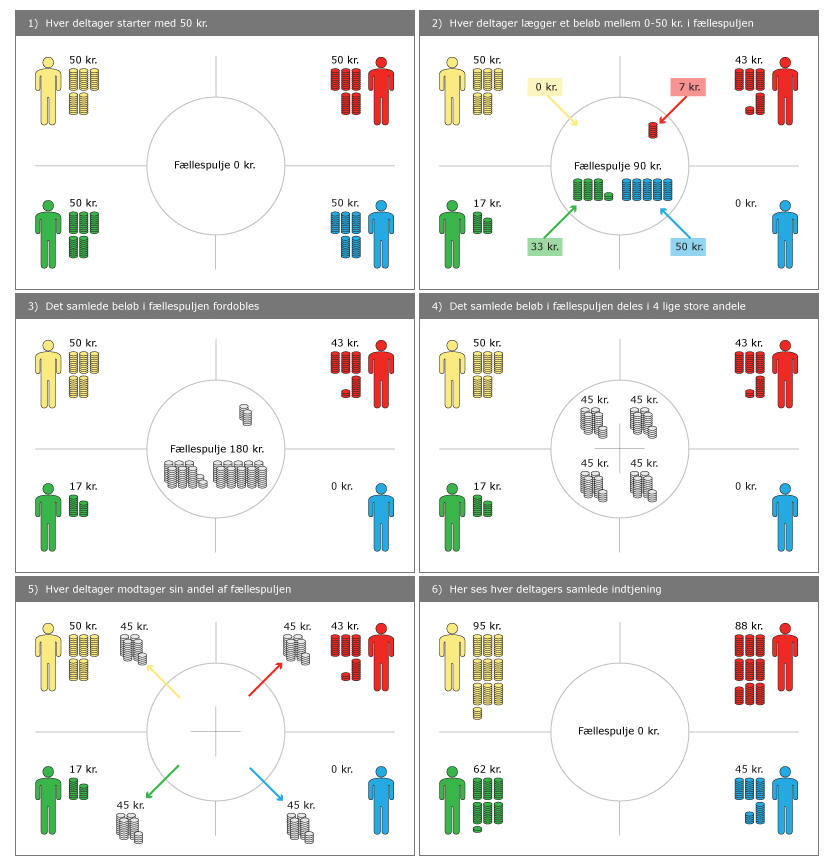
iLEE2 has been run in June 2009 with approximately 1500 completers. Participants for iLEE2 were recruited from participants who completed iLEE1.
The main purpose of this wave is to investigate sharing and (bilateral) redistribution choices. We are interested in answering questions like: How do sharing patterns depend on whether the total income to be shared was earned or not? Does people share diffrently if earned income depends on effort vs. luck?
The main module of this wave is a real effort dictator game. Participants earn money by working for 15 minutes (count yellow cells, see upper screenshot). Each correct answer earns one point. The points are converted into money according to a piece rate (which differs across participants). Participants are then anonymously matched with a series of other participants who had also worked before. One of the participants is assigned the role of the "dictator" who decides how the total earnings by both would be shared among the two participants. There are various treatments which differ, for example, by how costly it is to redistribute money from one person to the other (see second screenshot for an example with costly redistribution). In a control treatment, participants play the dictator game when money is given to them rather than earned.
Additional modules elicit preferences and attitudes in various non-incentivised tasks.
A more detailed description of iLEE2 can be found here.
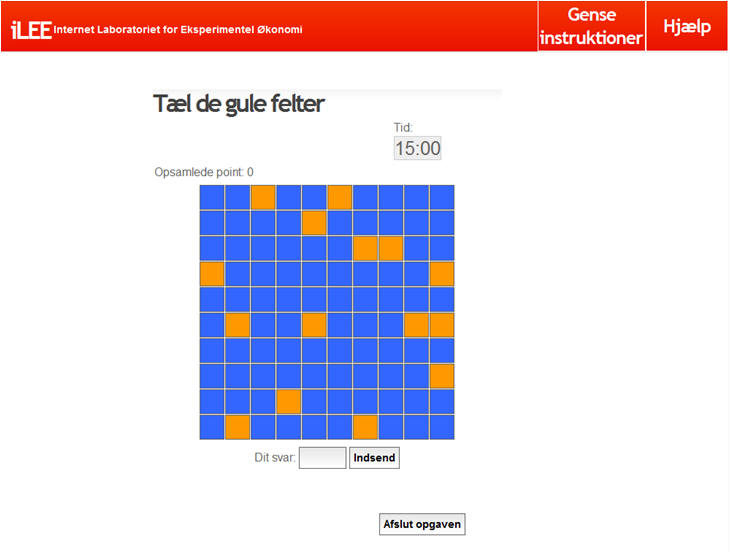
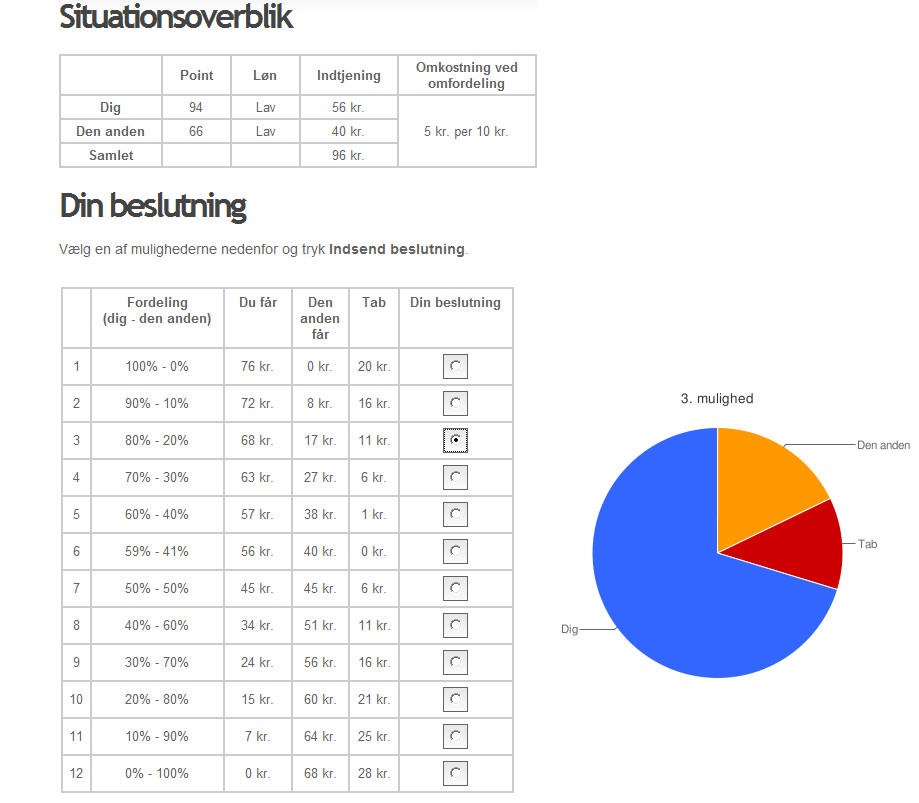
iLEE3 has been run in July 2010 with about 1100 participants completing the entire wave. Participants for iLEE3 were recruited from participants who completed iLEE1.
A main purpose of this wave is to gain a better understanding of trust and reputation in repeated interaction.
The main module in this part is a repeated trust game. In this game, a "first mover" (trustor) decides whether to trust ("in") or not ("out") a "second mover" (trustee). The first mover knows the "status" of the second mover when making the choice, i.e. whether the second mover "honoured trust" ("right") or not ("left") in previous interactions. Treatments differ by what first movers know about second movers (e.g. the length of their history). The screenshot below illustrates the trust game in a one-shot situation (when nothing is known about the reputation of the second mover).
Other modules in this wave include a voting game, work tasks to study the effects of incentive schemes, measures of preferences (risk, distributional) and survey-based measures (e.g. on nominal loss aversion in housing) and attitudes.
A more detailed description of iLEE3 can be found here.
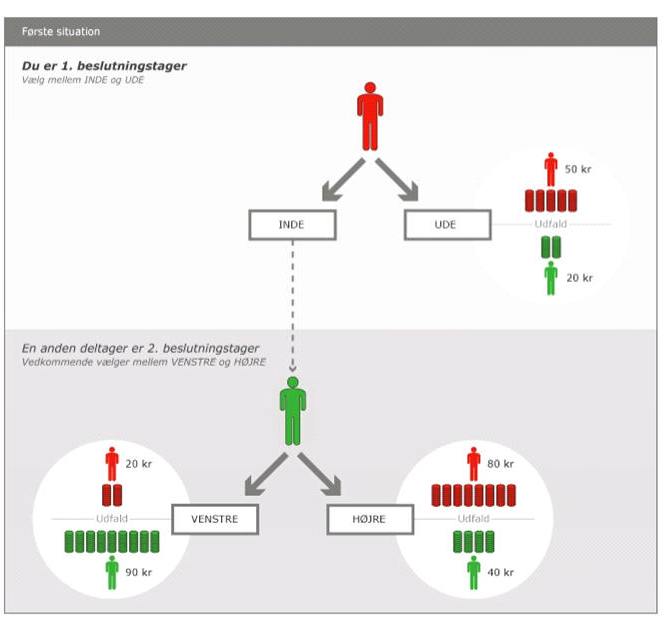
iLEE4 has been run in June 2011 with approximately 700 subjects completing the entire wave. Subjects were recruited from those completing iLEE1.
This wave serves to study diverse issues and could be called an "omnibus" wave. Modules involve individual choices, simple voting games in large groups and cognitively demanding (strategic) games.
Several modules serve to study behavior under risk. We are interested in answering questions like: How does the perception of risk (and the willingness to take risks) depend on previous outcomes of a risky prospect? How do investment choices depend on its presentation (in terms of nominal vs. real outcomes)? Does risk taking depend on whether one's choice affects others? Other issues are related to voting. For example, we are interested in understanding how participants predict policy outcomes on the basis of coalitions between parties, how they hold various parties responsible for (un)fair redistribution outcomes depending on their voting power, and whether voting depends on how likely an individual voter is to affect the outcome.
A more detailed description of iLEE4 can be found here.
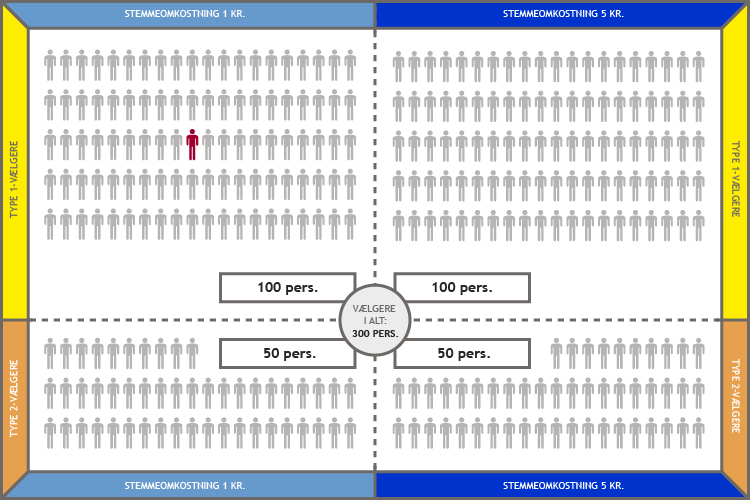
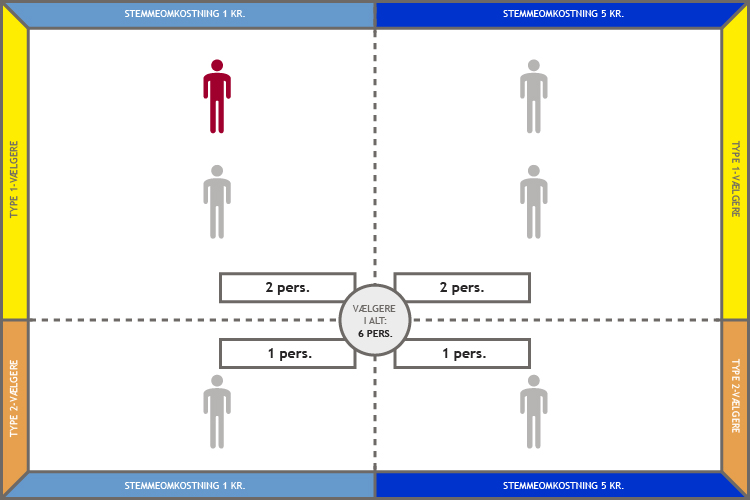
"Distributional Preferences Explain Individual Behavior Across Games and Time"
By Morten Hedegaard, Rudolf Kerschbamer, Daniel Müller and Jean-Robert Tyran
Games and Economic Behavior 2021, 128: 231-55.
Abstract: We use a large and heterogeneous sample of the Danish population to investigate the importance of distributional preferences for behavior in a trust game and a public good game. We find robust evidence for the significant explanatory power of distributional preferences. In fact, compared to twenty-one covariates, distributional preferences turn out to be the single most important predictor of behavior. Specifically, subjects who reveal benevolence in the domain of advantageous inequality are more likely to pick the trustworthy action in the trust game and contribute more to the public good than other subjects. Since the experiments were spread out more than one year, our results suggest that there is a component of distributional preferences that is stable across games and over time.
"Robust Inference in Risk Elicitation Tasks"
By Ola Andersson, Håkan J. Holm, Jean-Robert Tyran and Erik Wengström
Journal of Risk and Uncertainty 2020, 61: 195-209.
Abstract: Recent experimental evidence suggests that noisy behavior correlates strongly with personal characteristics. Since decision noise leads to bias in most elicitation tasks, there is a risk of falsely interpreting noise-driven relationships as preference driven. This puts previous studies that found a negative relation between personality measures and risk aversion into perspective and in particular raises the question of how to achieve robust inference in this domain. This paper shows, by way of an economic experiment with subjects from all walks of life, that using structural estimation to model heterogeneity of noise in combination with a balanced design allows us to mitigate the bias problem. Our estimations show that cognitive ability is related to noisy behavior rather than risk preferences. We also find age and education to be strongly related to noise, but the personality characteristics obtained using the Big Five inventory are less related to noise and more robustly correlated to risk preferences.
"Risking Other People’s Money. Experimental Evidence on Bonus Schemes, Competition, and Altruism"
By Ola Andersson, Håkan J. Holm, Jean-Robert Tyran and Erik Wengström
Scandinavian Journal of Economics 2020, 122(2): 648-74.
Abstract: Decision-makers often face incentives to increase risk-taking on behalf of others (e.g., they are offered bonus contracts and contracts based on relative performance). We conduct an experimental study of risk-taking on behalf of others using a large heterogeneous sample, and we find that people respond to such incentives without much apparent concern for stakeholders. Responses are heterogeneous and mitigated by personality traits. The findings suggest that a lack of concern for others’ risk exposure hardly requires “financial psychopaths” in order to flourish, but it is diminished by social concerns.
"Cooperation, Framing, and Political Attitudes"
By Toke Fosgaard, Lars Hansen and Erik Wengström
Journal of Economic Behavior and Organization 2019, 158: 416-27.
Abstract: This paper shows that political attitudes are linked to cooperative behavior in an incentivized experiment with a large sample randomly drawn from the Danish population. However, this relationship depends on the way the experiment is framed. In the standard game in which subjects give to a public good, contributions are not linked to political attitudes. In an economically equivalent version, in which subjects take from a public good, left-wingers cooperate significantly more than subjects to the right of the political spectrum. This difference is to some extent caused by differences in beliefs and cooperation preferences but a substantial part is left unexplained, indicating that left wingers find cooperating under this institution more attractive than right wingers do.
"Framing and Misperceptions in a Public Goods Experiment"
By Toke Fosgaard, Lars G. Hansen and Erik Wengström
Scandinavian Journal of Economics 2017, 119(2): 435-56.
Abstract: Earlier studies have found that framing has a substantial impact on the degree of cooperation observed in public good experiments. We show that the way the public good game is framed affects misperceptions about the incentives of the game. Moreover, we show that such framing-induced differences in misperceptions are linked to the framing effect on subjects' cooperation behavior. When we do not control for the different levels of misperceptions between frames, we observe a significant framing effect on subjects' cooperation preferences. However, this framing effect becomes insignificant once we remove subjects who misperceive.
"Gender Sorting into Jobs"
By Alexander Rabas
e-dissertation U Vienna 2017
Abstract: We develop an experimental design to shed new light on the drivers of gender sorting, in particular the well-established fact that women tend to sort into jobs with low pay and high job security. We draw subjects from a representative sample of the Danish population and match experimental choices to official socioeconomic register data. In line with previous studies, we find that women are more risk averse than men which explains some of the sorting. In addition, we find that women's tendency to sort into such jobs is driven by gender differences in personality, in particular emotional stability, as well as a lack of confidence of women into their productivity. Accordingly, men do the opposite - they tend to sort into jobs with high pay and low security, driven by their personality and their overconfidence in productivity. To validate our results, we show that choices made in the lab predict sorting in the Danish labor market.
"Deciding for Others Reduces Loss Aversion"
By Ola Andersson, Håkan J. Holm, Jean-Robert Tyran and Erik Wengström
Management Science 2016, 62(1): 29-36.
Abstract: We study risk taking on behalf of others, both when choices involve losses and when they do not. A large-scale incentivized experiment with subjects randomly drawn from the Danish population is conducted. We find that deciding for others reduces loss aversion. When choosing between risky prospects for which losses are ruled out by design, subjects make the same choices for themselves as for others. In contrast, when losses are possible, we find that the two types of choices differ. In particular, we find that subjects who make choices for themselves take less risk than those who decide for others when losses loom. This finding is consistent with an interpretation of loss aversion as a bias in decision making driven by emotions and that these emotions are reduced when making decisions for others
"Risk Aversion Relates to Cognitive Ability: Preferences or Noise?"
By Ola Andersson, Jean-Robert Tyran, Erik Wengström and Håkan J. Holm
Journal of the European Economic Association 2016, 14(5): 1129-54.
Abstract: Recent experimental studies suggest that risk aversion is negatively related to cognitive ability. In this paper we report evidence that this relation may be spurious. We recruit a large subject pool drawn from the general Danish population for our experiment. By presenting subjects with choice tasks that vary the bias induced by random choices, we are able to generate both negative and positive correlations between risk aversion and cognitive ability. Our results suggest that cognitive ability is related to random decision making rather than to risk preferences.
"Fairness is Intuitive"
By Alexander W. Cappelen, Ulrik H. Nielsen, Bertil Tungodden, Jean-Robert Tyran and Erik Wengström
Experimental Economics 2016, 19: 727-40.
Abstract: In this paper we provide new evidence showing that fair behavior is intuitive to most people. We find a strong association between a short response time and fair behavior in the dictator game. This association is robust to controls that take account of the fact that response time might be affected by the decision-maker's cognitive ability and swiftness. The experiment was conducted with a large and heterogeneous sample recruited from the general population in Denmark. We find a striking similarity in the association between response time and fair behavior across groups in the society, which suggests that the predisposition to act fairly is a general human trait.
"Personality Traits and the Gender Gap in Ideology"
By Rebecca Morton, Jean-Robert Tyran and Erik Wengström
Discussion paper, 16-08, 2016, Department of Economics, University of Copenhagen
Abstract: What explains the gender gap in ideology, i.e. the observation that women tend to be more leftist than men? We provide new evidence showing that personality traits play a key role. Using a novel high-quality data set, we show that the mediating (i.e. indirect) effects of gender operating through personality traits by far dominate the direct effects of gender. They also dominate other potential differences between the sexes like income or education as explanatory factors. Our findings suggest that women tend to be more leftist than men mainly because they have different personalities, which, in turn, shape their expressed ideology. Taking such mediating effects of personality traits into account explains over three quarters of the observed gender gap in general ideological preferences.
"Parents' Education and their Adult Offspring's Other-Regarding Behavior"
By Ulrik H. Nielsen
Discussion paper, 14-03, 2014, Department of Economics, University of Copenhagen
Abstract: Does socioeconomic background when measured by parental educational attainment explain the heterogeneity in adults' other-regarding preferences? I test this by using data from two online experiments -- a Dictator Game and a Trust Game that were conducted with a broad sample of the Danish adult population. I match the experimental data with high-quality data from the Danish population registers about my subjects and their parents. Whereas previous studies have found socioeconomic status, including parental educational attainment, to be predictive for children's generosity, I find no such evidence among adults. This result is robust across age groups and genders. I provide two explanations for this. First, sociodemographic characteristics in general appear to be poor predictors of adults' other-regarding behavior. Second, by using Danish survey data, I find that Danish parents' educational attainment appears to be uncorrelated with how important they find it to teach their children to "think of others". More speculative explanations are also provided.
"Understanding the Nature of Cooperation Variability"
By Toke Fosgaard, Lars G. Hansen, and Erik Wengström
Journal of Public Economics 2014, 120: 134-43.
Abstract: Our paper investigates framing effects in a large-scale public good experiment. We measure indicators of explanations previously proposed in the literature, which when combined with the large sample, enable us to estimate a structural model of framing effects. The model captures potential causal effects and the heterogeneity of cooperation behavior. We find that framing only has a small effect on the average level of cooperation but a substantial effect on behavioral heterogeneity explained almost exclusively by a corresponding change in the heterogeneity of beliefs about other subjects' behavior. The impact of changes in preferences and game form misperception is on the other hand negligible.
"Second Thoughts on Free Riding"
By Ulrik H. Nielsen, Jean-Robert Tyran and Erik Wengström
Economic Letters 2014, 122(2): 136-9.
Abstract: We use the strategy method to classify subjects into cooperator types in a large-scale online Public Goods Game and find that free riders spend more time on making their decisions than conditional cooperators and other cooperator types. This result is robust to reversing the framing of the game and is not driven by free riders lacking cognitive ability, confusion, or natural swiftness in responding. Our results suggest that conditional cooperation serves as a norm and that free riders need time to resolve a moral dilemma.
"Give and Take in Dictator Games"
By Alexander W. Cappelen, Ulrik H. Nielsen, Erik Ø. Sørensen, Bertil Tungodden and Jean-Robert Tyran
Economics Letters 2013, 118(2): 280-3.
Abstract: It has been shown that participants in the dictator game are less willing to transfer money to the other participant when their choice set also includes the option to take money. This paper examines whether this effect is due to the choice set providing participants with information about entitlements. We find that the share of positive transfers depends on the choice set even when there is no uncertainty about entitlements. We also find that this effect of choice sets is independent of personal characteristics.
"Microfoundations of Social Capital"
By Christian Thöni, Jean-Robert Tyran and Erik Wengström
Journal of Public Economics 2012, 96: 635-43.
Abstract: Research on social capital routinely relies on survey measures of trust which can be collected in large and heterogeneous samples at low cost. We validate such survey measures in an incentivized public goods experiment and show that they are importantly related to cooperation behavior in a large and heterogeneous sample. We provide evidence on the microfoundation of this relation by use of an experimental design that enables us to disentangle preferences for cooperation from beliefs about others’ cooperation. Our analysis suggests that the standard trust question used in the World Values Survey is a proxy for cooperation preferences rather than beliefs about others’ cooperation. In contrast, the “fairness question”, a recently proposed alternative to the standard trust question, seems to operate through beliefs rather than preferences.
" 'At least I didn't lose money' - Nominal Loss Aversion Shapes Evaluations of Housing Transactions"
By Thomas A. Stephens and Jean-Robert Tyran
<a href="https://econpapers.repec.org/paper/kudkuiedp/1214.htm" title="Read full discussion paper " at="'At" least="least" i="I" didn="" t="didn't" lose="lose" money="" -="-" nominal="Nominal" loss="Loss" aversion="Aversion" shapes="Shapes" evaluations="Evaluations" of="of" housing="Housing" transactions="" in="in" econpapers="">Discussion Paper No 12-14, 2012, Department of Economics, University of Copenhagen
Abstract: Loss aversion is one of the most robust findings to have emerged from behavioral economics. Surprisingly little attention, however, has been devoted to nominal loss aversion, the interaction of loss aversion and money illusion. People tend to think of transactions in terms of their nominal (monetary) values. Real losses may therefore loom larger in people’s minds when they lose money than when real losses are hidden by purely nominal gains. Using a survey experiment with a large and heterogeneous sample, we show that evaluations of housing transactions are systematically biased by purely nominal gains versus losses.
"Ethical versus Selfish Motivations and Turnout in Small and Large Elections"
By Rebecca Morton and Jean-Robert Tyran
Working paper, Center for Experimental Social Science, 2012, NYU
Abstract: We evaluate voter motivations using both small and large electorates with a diverse subject pool via two virtual laboratory experiments. We find little support for selfish instrumental turnout; that is, abstention does not increase with electorate size and voters who are in the minority abstain more than those in the majority. Expressive motivations, related to pro-social behavior, appear to explain the majority of voter turnout. Most of these voters make selfish voting choices. A smaller significant number of voters make ethical choices, which are best explained by instrumental ethical motivations or large expressive ethical utility. However, we also find a significant minority of voters appears to engage in bandwagon voting, which offsets the possible moral bias in electoral outcomes from ethical voting. Moreover, the percentage of ethical voting is unrelated to electorate size, so although we find a slight moral bias in electoral outcomes, it does not increase in electorate size.
"Income and Ideology: How Personality Traits, Cognitive Abilities, and Education Shape Political Attitudes"
By Rebecca Morton, Jean-Robert Tyran and Erik Wengström
Discussion paper, 11-08, 2011, Department of Economics, University of Copenhagen.
Abstract: We find that cognitive abilities, educational attainment, and some personality traits indirectly affect ideological preferences through changes in income. The effects of changes in personality traits on ideology directly and indirectly through income are in the same direction. However, the indirect effects of cognitive abilities and education often offset the direct effects of these variables on ideological preferences. That is, increases in cognitive abilities and education significantly increase income, which reduces the tendency of individuals to express leftist preferences. These indirect effects are in some cases sizeable relative to direct effects. The indirect effects of cognitive abilities through income overwhelm the direct effects such that increasing IQ increases rightwing preferences. For ideological preferences over economic policy the indirect effects of advanced education also overwhelm the direct effects, such that individuals with higher education are more likely to express rightwing preferences than those with lower education.
To date, four waves of the iLEE panel have been completed and numerous collaborators of Jean-Robert Tyran have contributed to its success. We have started publishing the results of the various experiments and we expect publications from the extraordinarily rich data set to be forthcoming over the coming years.
iLEE1
has been run in May 2008. The main collaborators are:
Erik Wengström (U Copenhagen and U Lund)
Toke Fosgaard (U Copenhagen)
Eva Gregersen (then U Copenhagen)
Lars Gårn Hansen (U Copenhagen)
Christian Thöni (then U St. Gallen)
Nikos Korfiatis (IT, then U Copenhagen)
In addition, the following students at U Copenhagen have supported us in preparing this wave, have written term papers and master theses on aspects of the data or the data collection process: Ditte Morup Andersen, Yue Bao, Katja Bächtold, Anne Okkels Birk, Catharina von Bülow, Sofie Cairo, Martin Damgaard, Ann-Kathrine Ejsing, Lise Sand Ellerbæk, Anders Fonnesbech-Wulff, Eva Hansen, David Boysen Jensen, Tine Kildegaard, Frank Mabit, Kristoffer Sylvester Mar0kwardt, Jakob Mølgaard, Anja S. Møller, Michael Mørch-Denbæk, Sune Neye, Peer Skov, Louise Rathsach Skouby, Thomas Stephens, Lizette Taguchi, Alexander Zerrahn.
iLEE2
has been run in June 2009. The main collaborators are:
Alexander Cappelen (NHH Bergen)
Eva Gregersen (then U Copenhagen)
Erik O. Sorensen (NHH Bergen)
Thomas Stephens (U Vienna)
Bertil Tungodden (NHH Bergen)
Erik Wengström (U Copenhagen and U Lund)
Nikos Korfiatis (IT, then U Copenhagen)
iLEE3
has been run in July 2010. The main collaborators are:
Dirk Engelmann (U Mannheim)
Eva Gregersen (then U Copenhagen)
Morten Hedegaard (then U Copenhagen)
Rudolf Kerschbamer (U Innsbruck)
Rebecca Morton (NYU)
Alexander Rabas (U Vienna)
Rupert Sausgruber (U Innsbruck)
Thomas Stephens (U Vienna)
Erik Wengström (U Copenhagen and U Lund)
Nikos Korfiatis (IT, then U Copenhagen)
iLEE4
has been run in June 2011. The main collaborators are:
Ola Andersson (Stockholm)
Alexander Cappelen (NHH Bergen)
Raymond Duch (Oxford)
Hakan Holm (Lund U)
Rebecca Morton (NYU)
Ulrik H. Nielsen (U Copenhagen)
Thomas Stephens (U Vienna)
Sigrid Suetens (Tilburg U)
Erik O. Sorensen (NHH Bergen)
Bertil Tungodden (NHH Bergen)
Erik Wengström (U Copenhagen and U Lund)
Tobias Christiani (IT, U Copenhagen)

